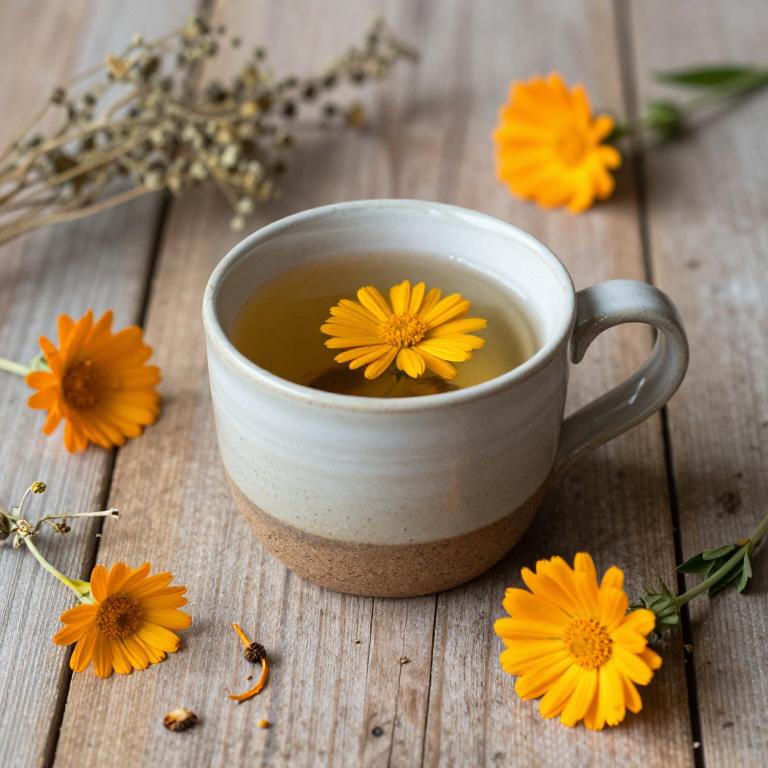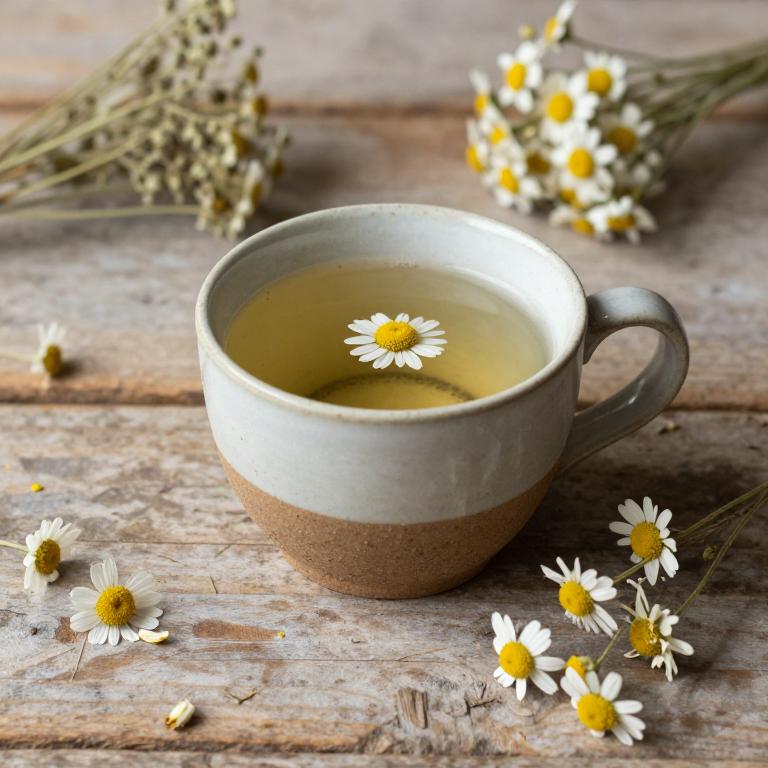10 Best Herbal Teas For Boils

Herbal teas can be a natural and soothing remedy for boils due to their anti-inflammatory and antimicrobial properties.
Chamomile, calendula, and echinacea are commonly used herbs that help reduce inflammation and promote healing. To prepare the tea, steep a few fresh or dried leaves in hot water for several minutes, then apply the warm liquid to the affected area using a clean cloth. Regular use of these herbal teas can help ease pain and speed up the healing process.
However, it is important to consult a healthcare professional if the boil persists or shows signs of infection.
Table of Contents
- 1. St. john's wort (Hypericum perforatum)
- 2. Stinging nettle (Urtica dioica)
- 3. Marigold (Calendula officinalis)
- 4. Echinacea (Echinacea purpurea)
- 5. German chamomile (Chamomilla recutita)
- 6. Yarrow (Achillea millefolium)
- 7. Thyme (Thymus vulgaris)
- 8. Dog rose (Rosa canina)
- 9. Rosemary (Rosmarinus officinalis)
- 10. Field horsetail (Equisetum arvense)
1. St. john's wort (Hypericum perforatum)

Hypericum perforatum, commonly known as St. John's Wort, is often used in herbal teas to support skin health and reduce inflammation, including in the treatment of boils.
The tea is believed to have antimicrobial and anti-inflammatory properties that may help in the healing process of infected skin lesions. While it is not a direct cure for boils, it can be a complementary therapy when used alongside conventional treatments. To prepare the tea, a handful of dried Hypericum perforatum is steeped in hot water for several minutes, and it is typically consumed warm.
However, it is important to consult a healthcare professional before using this herb, especially if you are taking other medications, as it can interact with certain drugs.
2. Stinging nettle (Urtica dioica)

Urtica dioica, commonly known as stinging nettle, is a versatile herb that has been traditionally used for its anti-inflammatory and detoxifying properties.
When brewed into a herbal tea, stinging nettle can help reduce the swelling and pain associated with boils by promoting the body's natural healing processes. The tea is believed to support the immune system and may help drain infections, making it a potential complementary remedy for skin conditions like boils. To prepare the tea, fresh or dried nettle leaves are steeped in hot water for several minutes, and it is often consumed warm.
While it is generally safe for most people, those with allergies or on certain medications should consult a healthcare provider before using stinging nettle tea.
3. Marigold (Calendula officinalis)

Calendula officinalis, commonly known as pot marigold, is a popular herbal remedy used in teas to support the healing of boils due to its anti-inflammatory and antimicrobial properties.
The flowers of this plant contain compounds like flavonoids and triterpenes, which help reduce swelling and fight bacterial infections that often accompany skin abscesses. When brewed into a soothing tea, calendula can be applied topically as a compress to ease pain and promote drainage of boils. While it is generally considered safe for most adults, it is important to consult a healthcare provider before using it, especially for those with allergies or underlying health conditions.
Regular use of calendula tea may aid in the overall healing process and support skin health when used as part of a comprehensive treatment plan.
4. Echinacea (Echinacea purpurea)

Echinacea purpurea, commonly known as purple coneflower, is a popular herbal remedy often used in teas to support immune health.
While it is generally recognized for its potential to reduce the duration and severity of colds, some people also use echinacea tea for boils due to its anti-inflammatory and antimicrobial properties. Boils are painful, pus-filled infections that typically develop in hair follicles, and echinacea may help by promoting the body's natural defenses against bacterial infections. However, it is important to note that echinacea should not replace medical treatment for severe or persistent boils, and individuals should consult a healthcare professional if symptoms worsen.
When consumed as a tea, echinacea is typically prepared by steeping dried leaves and flowers in hot water, and it may be combined with other herbs like goldenseal or chamomile for added benefits.
5. German chamomile (Chamomilla recutita)

Chamomilla recutita, commonly known as German chamomile, is a popular herbal remedy often used in teas to address skin issues such as boils.
The tea is prepared by steeping dried chamomile flowers in hot water, creating a soothing and anti-inflammatory beverage. It is believed that the essential oils in chamomile, such as bisabolol and chamazulene, help reduce redness, swelling, and infection associated with boils. Some people apply the cooled tea directly to the affected area as a compress to ease discomfort and promote healing.
While chamomile tea may offer relief, it is advisable to consult a healthcare professional for persistent or severe boils to rule out more serious underlying conditions.
6. Yarrow (Achillea millefolium)

Achillea millefolium, commonly known as yarrow, has been traditionally used in herbal medicine for its anti-inflammatory and antiseptic properties.
When brewed into a tea, yarrow can help reduce swelling and redness associated with boils by promoting circulation and soothing the skin. It is often recommended to drink yarrow tea internally to support the body's natural healing processes and reduce systemic inflammation. However, it is important to consult with a healthcare professional before using yarrow, especially for those with allergies or on medication.
While yarrow tea may offer some relief for boils, it should not replace medical treatment for severe or persistent infections.
7. Thyme (Thymus vulgaris)

Thymus vulgaris, commonly known as thyme, is a popular herb used in herbal teas for its potential anti-inflammatory and antimicrobial properties.
When brewed into a tea, thyme can help reduce the pain and swelling associated with boils by promoting the body's natural healing processes. The essential oils in thyme, particularly thymol, have been shown to inhibit bacterial growth, which may aid in preventing infection in boils. To prepare the tea, steep a teaspoon of dried thyme in hot water for several minutes, and drink it several times a day.
While thyme tea may offer some relief, it is advisable to consult a healthcare professional for persistent or severe boils.
8. Dog rose (Rosa canina)

Rosa canina, also known as rosehip, is a traditional herbal remedy that has been used for centuries to support skin health and reduce inflammation.
When brewed into a tea, rosehip provides a rich source of antioxidants, vitamins, and essential nutrients that may help in the healing process of boils. The anti-inflammatory properties of rosehip can help soothe the skin and reduce redness and swelling associated with boils. It is often recommended to drink rosehip tea regularly as part of a holistic approach to managing skin conditions.
However, it is important to consult with a healthcare professional before using it, especially if you have underlying health conditions or are taking medications.
9. Rosemary (Rosmarinus officinalis)

Rosmarinus officinalis, commonly known as rosemary, is a fragrant herb that has been traditionally used for its medicinal properties, including its potential benefits in treating boils.
Rosemary herbal teas are made by steeping fresh or dried rosemary leaves in hot water, creating a soothing beverage that may help reduce inflammation and promote healing. The essential oils in rosemary, such as camphor and cineole, have antimicrobial and anti-inflammatory effects that may aid in combating the infection associated with boils. While rosemary tea is not a cure for boils, it can be a supportive complementary treatment when used alongside proper medical care.
However, individuals with sensitive skin or allergies should consult a healthcare provider before using rosemary-based remedies.
10. Field horsetail (Equisetum arvense)

Equisetum arvense, commonly known as field horsetail, has been traditionally used in herbal teas to help alleviate symptoms associated with boils due to its high concentration of silica and anti-inflammatory properties.
The tea is believed to promote the drainage of pus and reduce swelling, which can aid in the healing process of infected skin lesions. While some studies suggest that the silica in horsetail may support tissue repair and skin health, more research is needed to confirm its efficacy for treating boils. It is often recommended to use Equisetum arvense tea as a complementary remedy alongside conventional medical treatments for boils.
As with any herbal remedy, it is important to consult a healthcare professional before use, especially for individuals with existing health conditions or those taking medications.